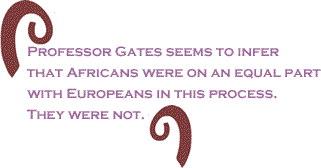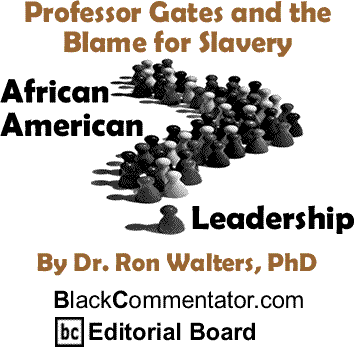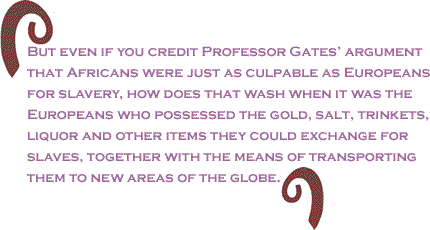
|
||||||||||||||||||||||
|
||
 |
||
Like everyone else who read Professor Skip Gates� piece in the New York Times asserting that Africans were just as responsible for slavery as Europeans, I was aghast because he is one of the most acclaimed scholars in the country and his position lends credibility to those who oppose an historical corrective for the oppression of African peoples. Admittedly, my concern also arises from the publication of my most recent book on Reparations, �The Price of Racial Reconciliation (The Politics of Race and Ethnicity)� in which I take a strong position favoring Reparations as a long time member of this movement. Although Prof. Gates� argument is cast in scholarly terms, it should be said that he is not a recognized scholar of African history, a fact which has caused him to design a simple equation of the culpability of Africans with Europeans in the slave trade. This cannot be so even if accedes his point that Africans were surely involved in the slave trade. The other side of the story is that in the 300 years from the middle of the 16th to the 19th centuries, the slave trade evolved into one of the primary, if not the engine of the first sincere wave of globalization. The development of trading firms from Spain and Portugal to England were the result of the enormous profits from the trade that enriched towns and cities throughout Europe and the Americas and allowed for the extension of European armies and traders into the interior of Africa to concretize the process of colonialism. I use the word �concretize� because Professor Gates seems to infer that Africans were on an equal part with Europeans in this process. They were not. Consider if you were a chief who sold an enslaved African to a European and received a bottle of rum or some trinkets for the sale. What could you do with that resource? How powerful was it? On the other hand, the person who was sold to the European constituted a dynamic resource because he and she could produce others, could work for years to enrich the owner and with the profits, the owner could create new civilizations. There then, is no sense of �equality� between the two in the process of the exchange of slaves. But even if you credit Professor Gates� argument that Africans were just as culpable as Europeans for slavery, how does that wash when it was the Europeans who possessed the gold, salt, trinkets, liquor and other items they could exchange for slaves, together with the means of transporting them to new areas of the globe. Even though Europeans did not traverse the interior of Africa until the middle of the 19th century, they did not need to do so, because most of the West African population was near to the Coastal areas except for the Angola/Congolese areas. The great civilizations of the Mali/Songhai area was defeated by the Islamic invasion beginning in the 7th century and was still under the control of much of North Africa at the time of European entry into Africa. So, Europeans built fortresses on the coast of West Africa to administer the process of slavery made possible by the introduction of European armies that did make forays into the interior and back to the coast with slaves. In short, the truth is that if Europeans did not have the infrastructure for slavery, it would not have been profitable to Africans and thus, would not have become the vast commercial global enterprise that it did.
I consider the slave trade one of the aspects of what I call �The Grand Narrative of Oppression.� This narrative has many parts. Professor Gates� argument does not even take into consideration the fact that when the Transatlantic slave trade ended, a local slave trade matured inside the United States run by whites with the same features of production and distribution of enslaved peoples that carried over fro m the original trade. Then, he does not consider the fact that slavery itself extended into the 20th century and that the racism against so-called �free� peoples of African descent became a major feature of oppression that also calls for Reparations.
BlackCommentator.com Editorial Board member, Dr. Ron Walters, PhD is a Political Analyst, Author and Professor Emeritus of the University of Maryland, College Park. His latest book is: The Price of Racial Reconciliation (The Politics of Race and Ethnicity) (University of Michigan Press). Click here to contact Dr. Walters. |
||
If you would like to comment on this article, please do so below. There is a 400 character limit. You do not need a FaceBook account. Your comment will be posted here on BC instantly. Thanks. Entering your email address is not mandatory. You may also choose to enter only your first name and your location.
|
||
Thank you very much for your readership. |
||
| Any BlackCommentator.com article may be re-printed so long as it is re-printed in its entirety and full credit given to the author and www.BlackCommentator.com. If the re-print is on the Internet we additionally request a link back to the original piece on our Website. | ||
| |
||
May 6, 2010 |
| Executive Editor: David A. Love, JD |
| Managing Editor: Nancy Littlefield |
| Publisher: Peter Gamble |
| Est. April 5, 2002 |
| Printer Friendly Version in resizeable plain text format |
 |
 |
 |

|
 |
| |
| |













































